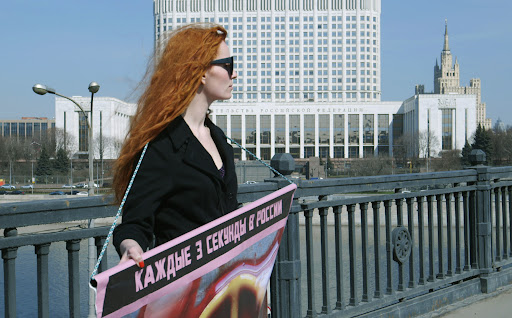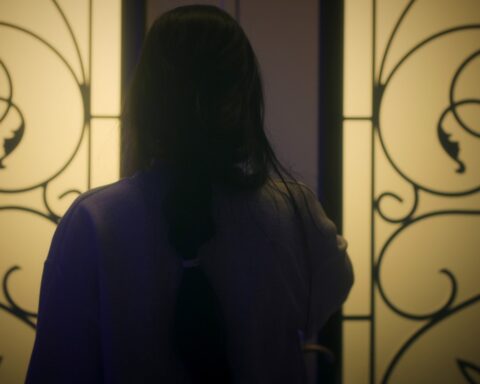In Faith Hope Love, a new documentary that just premiered at the 25th edition of Hot Docs Canadian International Documentary Festival, director Katja Fedulova examines the role of women in modern-day Russia. The documentary sheds light on the lives of three Russian women.
Olga is a politician who fights vehemently against governmental corruption. Natalia is an anti-abortion activist and zealous Christian. And Anastasia is a former beauty queen who has just returned from the war zone in Eastern Ukraine. All three heroines represent different aspects of Russian society but share an allegiance to their values and country.
As a Russian-born immigrant, Fedulova offers the audiences a unique perspective. She finds a way to scrutinize the current socio-political landscape of her country, while humanizing a nation disguised by its seemingly hostile exterior. Questioning her heroines’ work and ideologies, Fedulova’s film is a personal journey and a nuanced commentary on Russia’s social and political movements. Critical but open-minded, confrontational but empathetic, Fedulova doesn’t satisfy the audiences with clear-cut explanations. And this might be the most exasperating and yet beautiful part of her documentary.
POV met with Fedulova after the premiere of her film to discuss her new documentary and ask about the director’s viewpoints on the role of women in Russia and the direction that the country is currently heading.—Anastasia Akulinina
POV: Anastasia Akulinina
KF: Katja Fedulova
POV: What inspired you to make this film?
KF: From the beginning, I had an idea of making a film about Russian women who are fighting for the political ideology that they believe in.
I once told a friend that Faith, Hope and Love were the daughters of the Holy Martyr Saint Sophia. At the time when Christianity was just starting to grow, they were fighting for their faith and had to sacrifice their own lives for their beliefs. As I was saying this, I asked myself, who are Faith, Hope and Love in modern-day Russia and what are they fighting for?
Since I was born and raised in the USSR, Soviet ideology had a great influence on my development. My grandmother, who fought in World War Two, was a true hero to me. I always wanted to fight for the country, and I was even ready to die for it when I was a kid. As I grew older and after Perestroika, when all our values were changed, I started to think differently.
But I never stopped thinking about the role that women play in fighting for their homeland. Men are usually seen as martyrs and protectors of Russia. Women have always been less noticed. During World War Two, more than a million women went to war but almost no one talks about them. And it is only recently that Svetlana Alexievich wrote a book about them, The Unwomanly Face of War: An Oral History of Women in World War II. That was the first time that we talked about women who went to war in the same way we talked about men.
POV: Why did you choose Olga, Natalia and Anastasia to be the heroines of your film?
KF: Faith, Hope and Love were always the most important references for me.
“Faith” stands for religion, specifically the return of Orthodox Christianity to Russia. I have noticed that in the last 10 years the church has taken a prominent role in our society and started interfering in politics. People have become much more religious, and there is a division between religious and non-religious people. For many young Russians, religion has become very important because it has replaced Soviet ideology.
“Hope,” for me, symbolizes the hope for democracy and liberal movements in Russia, which are also divisive and contradictory. They do exist but aren’t transparent or strong enough.
“Love” stands for the growing neo-patriotism, ultra-patriotism, which is based on the propaganda that has been taking place ever since the war broke out in Ukraine.
I started doing research to find women who represent these three movements. I found Olga Li the fastest because I saw her video message to Putin. Natalia was referred to me by the people from the Orthodox movement. Anastasia was also referred to me. She made a video coverage from the war in Ukraine and was a former beauty queen so I could easily find her.
At first, I was surprised by how beautiful they were. But it was important for me to show that these women must be beautiful. In Russia, if you’re a woman and you want to be successful, whether it’s show business or politics, you must look good and be noticeable. If you don’t look good and stand out, you won’t have the same opportunities.
POV: In Russia, women outnumber men by millions and are oftentimes the sole providers for their families. Meanwhile, chauvinism still dominates the country and children are often raised with patriarchal values. What do you think about this contrast between reality and ideology?
KF: The thing is that ever since the USSR, it was believed that men and women in Russia were equal, because every woman could work. There were always less women occupying higher positions or working in politics, but nonetheless if we compare Soviet Russia with some of the Western countries at the time, Russia was in fact more progressive in terms of gender equality.
But as soon as the workday ended, equality vanished as well. Men used to come back from work, sit on the couch and turn on the TV, while women started to cook, clean and take care of the kids. For me, this contradicts the superficial idea of gender parity in the USSR. In Russia, despite our Soviet past, men and women were never equal.
Today, this is even more noticeable due to the growing struggle for the return of old Russian values and traditions. Gender roles are becoming more prominent. In my opinion, it is again being affected by the rising influence of the Orthodox Church, which actively dictates and even enforces new rules and regulations, oftentimes through its own propaganda. And it’s possible that it will get worse than it was in Soviet times. I think Russia has always been conservative. In the USSR, it was skillfully disguised by window dressing but today it’s becoming more open.
POV: Are there any prominent feminist movements in Russia? How do you think the “Me Too” movement is impacting the country?
KF: Of course! In Russia, there’s a big feminist movement, which I didn’t know about before I started filming my documentary. There are many feminist organizations and collectives, which, by the way, have many male members as well. “Me Too” is very international and in Russia, people have been affected by it. For instance, in Duma, a journalist recently accused one of the politicians of sexual harassment, and many people have been speaking up ever since. So, “Me Too” exists everywhere, including Russia, thank God.
POV: Do you think your subjects are in some way a problem of the society themselves?
KF: I don’t think they’re a problem. The society is a problem and these women are representatives of this society. Could these women change Russia? I don’t think they can. I think Natalia is the one who is most likely to make a change because even in the film it’s evident that she is very successful and has many supporters. I think she might make a difference but I don’t think it will be a positive change in the development of Russia.
Olga, for me, like many other women, symbolizes this situation when behind a woman there is a man. It’s similar to the movement Femen. It was revealed that Femen was founded by three Ukrainian businessmen, who simply wanted there to be a movement like this. The same goes for Olga. As soon as her sponsor Constantin leaves her, she stops her political activity. But I think there are definitely women in Russia, especially in feminist movements, who work independently without any hidden help from male sponsors.
POV: World War Two and Stalinism are the recurring themes in your documentary. Do you think that it is critical to remember those dramatic times right now?
KF: I think it’s obvious that today we are witnessing the return of Stalin’s cult of personality in Russia. He is becoming a hero again, especially for the younger generation that hasn’t read any literature, for instance The Gulag Archipelago, and who get all their information from the Internet. Everything that bloggers write is deemed as historical truth. That’s why what’s happening in Russia right now is very dangerous. People start celebrating war and see it in an absurd light. They start idealizing it; it is becoming a religion. And in this context, Stalin reoccurs. For me, it was important to show because I am worried that this will lead to the repetition of our history. When people idealize our war (World War Two), they can easily go and fight in a new war, like Anastasia.
POV: What were the main challenges of making the film?
KF: The most difficult was the confrontation with Natalia’s colleague during the anti-abortion summit in Petrozavodsk. After their presentation, I shared with them the story of my rape. It was very hard to tell in front of the cameras, because it is a very painful story. I had to recollect my memories. But it was very much needed because I was the only witness of how it can happen, which directly contradicted their views and ideologies.
POV: Do you have any plans for a new film?
KF: I have already made a new film! I made a documentary about the youngest deputy in Duma, Vasily Vlasov, the right hand of the LDPR (Liberal Democratic Party of Russia) leader Zhirinovsky. Vlasov became a politician when he was 21. The film is called Patriot. It is about the younger generation in Russia, who have these patriotic post-Soviet ideologies.
It has become very fashionable in Russia to join politics now. There are a lot of political organizations that offer growth opportunities, and you can really make a career out of it. The same thing happened with Vlasov. He is a very ambitious young man and wants to change the country for the better. He isn’t afraid to criticize Putin and openly talks about the problems in Russia. But he is doing it today. What will he do in the future when he works his way up?
In general, the film profiles the contemporary political youth movements and youth in Russia, their views and interests. And I think they are very similar to the youth of my childhood in the USSR.
Faith Hope Love screens:
-Sat, May 5 at 9:15 PM at TIFF Lightbox
Hot Docs runs April 26 to May 6. Please visit hotdocs.ca for more info.









